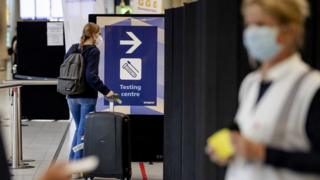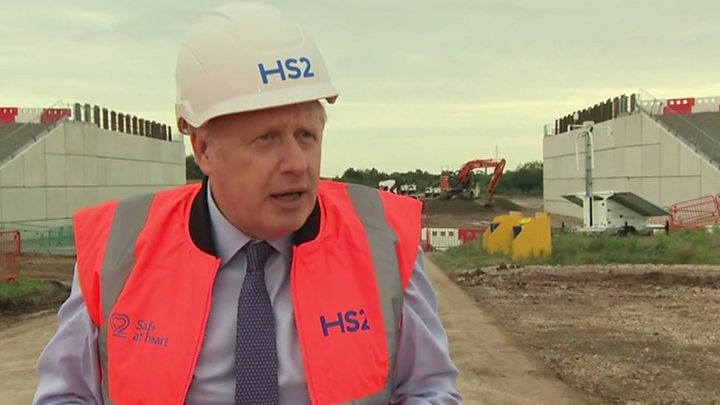 Image copyright
Image copyright
EPA
Airport coronavirus testing options should be explored as a way of cutting the number of travellers who must spend two weeks in quarantine, says Labour.
A review of “chaotic” quarantine rules should consider a “robust testing regime”, given the “dire warnings” from the travel industry, the party says.
PM Boris Johnson has said airport tests would identify only 7% of cases and so could give a “false sense of security”.
A government spokesman said assessment of how testing might help was ongoing.
“Any potential change to the testing for arrivals would need to be robust in minimising the chance that positive cases are missed,” he said.
The BBC has been told a cabinet decision on whether to introduce airport testing has been repeatedly postponed and now may never happen.
People entering the UK face 14 days of self-isolation unless they are travelling from countries that are exempt – a status determined by the separate authorities in each of the four nations.
In recent weeks, Britons holidaying in France, Spain and the Netherlands have been caught out by the removal of exemptions at short notice.
Last week, Scotland and Wales told arrivals from Portugal and parts of Greece to quarantine, while England and Northern Ireland held off.
UK Transport Secretary Grant Shapps admitted it had created a “confusing” situation for travellers.

Media playback is unsupported on your device
And in a letter to Home Secretary Priti Patel, Labour argues the arrangements are “losing public confidence and undermining our ability to keep people safe and save jobs”.
Shadow home secretary Nick Thomas-Symonds calls for a review to report back within a fortnight.
“It should include outlining options for a robust testing regime in airports, and related follow-up tests, that could help to safely minimise the need for 14-day quarantine,” he writes.
“Given the huge challenges being faced by the travel sector and the scale of job losses, it makes sense to look at this area as part of a wider package of improvements to the testing regime.”
He also said there were “serious concerns” poor monitoring of incoming travellers, claiming “less than a third of passenger-locator forms are checked”.
Airlines have criticised the use of quarantine measures at a time when lockdowns around the world have contributed to a collapse in passenger demand.
On Friday, Virgin Atlantic announced plans to axe another 1,150 jobs after completing a £1.2bn rescue deal, months after making 3,150 redundancies as a result of the collapse in demand caused by the pandemic.
Airport bosses have also criticised ministers.
On-site testing facilities had already been set up at London’s Heathrow Airport, chief executive John Holland-Kaye said last week.
“It is frustrating that the government just has not made a decision to get on with this, when governments in other countries in Europe are getting on and making it happen,” he added.
France and Germany are using testing at airports for passengers arriving from countries with a higher infection rate.
And, on Friday, former Brexit Secretary David Davis said testing at UK airports – with passengers given results within two hours – could cut quarantine to “less than five days”.
“If anybody is positive, they should be quarantined right there,” he said, arguing the government could pay to house them in under-used airport hotels.
However, the prime minister responded by pointing to Public Health England modelling suggesting only 7% of cases would be picked up.
While he understood “the difficulties” the airline industry was facing, Mr Johnson said “93% of the time you could have a real false sense of security, a false sense of confidence when you arrive and take a test”.
“The quarantine system that we have has got to be an important part of our repertoire, of our toolbox, in fighting Covid,” he added.
- THE NAKED SCIENTISTS: Where did COVID-19 come from?
- “WE’RE ALL STRONGER THAN WE THINK”: What are the positives of 2020?